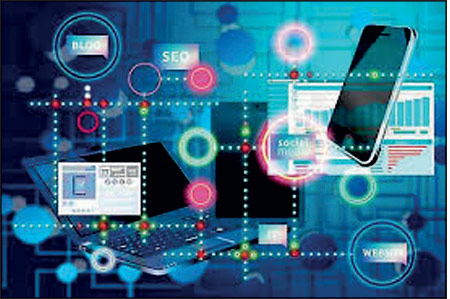Thursday Feb 19, 2026
Thursday Feb 19, 2026
Monday, 27 October 2025 03:49 - - {{hitsCtrl.values.hits}}
 Sri Lanka’s digital economy is estimated at Rs. 1,342 billion, accounting for 4.5% of GDP, according to the Institute of Policy Studies’ (IPS) Annual State of the Economy 2025 report.
Sri Lanka’s digital economy is estimated at Rs. 1,342 billion, accounting for 4.5% of GDP, according to the Institute of Policy Studies’ (IPS) Annual State of the Economy 2025 report.
The report said digital businesses and online platforms are driving innovation, creating new products, and reducing transaction costs, while supporting sustainable economic growth and competitiveness.
The IPS noted that information and communication services have become a key driver of Sri Lanka’s services sector, contributing steadily to the economy in recent years.
The digital sector’s upward trajectory has been accelerated by the global shift towards digitalisation, particularly during the COVID-19 pandemic, which expanded demand for digital solutions.
The report said the ICT-BPO sector experienced rapid expansion between 2015 and 2020, with the number of firms tripling and the workforce doubling. ICT and BPO-related services generated about $ 850 million in revenue in 2020.
According to the last available census survey conducted in 2018, the workforce grew 51% over five years to 124,873, recording an annual growth rate of around 10%. Projections indicate the ICT, BPO, and BPM workforce will reach 300,000 by 2025, generating $ 2 billion in export earnings.
“Sri Lanka’s ICT-BPM industry is also expected to foster the development of over 1,000 technology startups, further solidifying its position as a dynamic digital economy,” the IPS report said.
The size of the digital economy, based on Central Bank data, is dominated by information and communication activities valued at Rs. 606.7 billion, or 2.03% of GDP, and e-commerce estimated at Rs. 735.2 billion, or 2.47% of GDP.
The report noted that the e-commerce value was calculated by doubling the total card-based transaction volume on the assumption that cash payments account for half of all online purchases.
E-commerce has become a notable driver of digital engagement in Sri Lanka.
“Many Sri Lankan businesses have established an online presence through e-commerce platforms, social media, and dedicated websites,” the IPS said. Rising internet penetration, improved payment gateways, and digital literacy have helped the sector grow rapidly.
In 2024, total e-commerce transactions via debit and credit cards amounted to Rs. 367.8 billion. The overall value of e-commerce transactions was estimated at Rs. 735.2 billion and is projected to grow annually at 10.8%, reaching an estimated $ 3.9 billion by 2029.
The report said consumer behaviour has also shifted in favour of online purchases, with around 52% of internet users making online purchases at least once a month.
Digital advertising plays a strong role in influencing buying decisions, with 58% of users reporting they bought products online after seeing digital ads. The most commonly purchased items were clothing at 43%, personal care and beauty products at 23%, and electronics and accessories at 22%.
The IPS identified e-services as another fast-growing area, reshaping how citizens access services such as food delivery, education, transportation, healthcare, and Government transactions. “E-services are becoming increasingly integrated into the daily lives of Sri Lankans, particularly in urban areas,” the report said.
The e-services sector is forecast to expand at an annual rate of 15.7%, reaching a market volume of $ 1.9 billion and 6.4 million users by 2029. User penetration is expected to reach 23% of the population by 2025, driven by internet access, smartphone usage, and consumer receptivity to digital platforms.
The IPS said the continued evolution of e-services and e-commerce will be central to enhancing service delivery, improving efficiency, and promoting inclusive digital growth.
“The expansion of these sectors will be key to reducing friction in economic transactions and supporting broader goals of digital inclusion and economic modernisation,” it said.